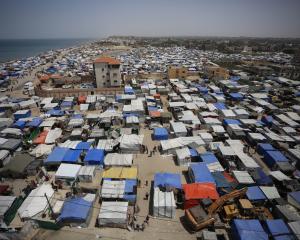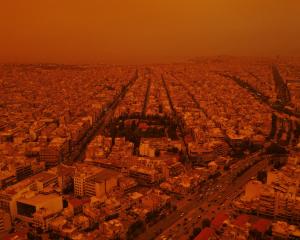An employee at the site, however, said Islamic State fighters still held the Mosul Dam, giving them control over power and water supplies and where any breach of the vulnerable structure would threaten thousands of lives.
US fighter, bomber and drone aircraft took part in the strikes on Islamic State positions near the dam, the Pentagon said. The strikes damaged or destroyed six armed vehicles, a light armoured vehicle and other equipment.
The US military said it believed the air strikes around the dam had been effective in holding Islamic State militants in place so Iraqi and Kurdish forces could manoeuvre against them.
But Army Colonel Steve Warren, a Pentagon spokesman, said operations around the dam were "ongoing" and he was not prepared yet to say whether it had been retaken by Iraqi forces.
As fighting intensified, Islamic State militants were said to have killed dozens of Kurdish fighters and captured 170 of them, according to a Twitter site that supports the group.
The Islamists' seizure of the Mosul hydroelectric dam in northern Iraq earlier this month marked a stunning setback for Baghdad's Shi'ite-led authorities and raised fears the militants could cut electricity and water, or even blow the shaky structure, causing huge loss of life and damage down the Tigris river valley.
"The failure of the Mosul Dam could threaten the lives of large numbers of civilians, threaten US personnel and facilities - including the US Embassy in Baghdad - and prevent the Iraqi government from providing critical services to the Iraqi populace," a senior US administration official said In Washington.
Iraqi officials hailed what they said was a strategic victory in regaining control of the dam, and announced that the next objective would be to win back Mosul itself, the biggest city in northern Iraq which lies 40 km (25 miles) downstream.
HOSTAGE
However, any lingering threat to the dam from IS fighters would be like a gun to the city's head, holding it hostage.
Hoshiyar Zebari, a top Kurdish official, said Iraqi Kurd forces had captured the dam - blighted by structural problems since it was built by West German engineers for Saddam Hussein in the 1980s - with help from US air strikes nearby in a difficult operation.
"Taking the dam took longer than expected because Islamic State had planted land mines," he told Reuters.
Baghdad officials vowed to turn the tide against Islamic State, whose campaign to create a regional caliphate has threatened to tear Iraq apart.
"The new tactic of launching a quick attack shrouded by secrecy proved successful and we are determined to keep following the new assault tactics with help of intelligence provided by Americans," Sabah Nouri, a spokesman for Iraq's counter-terrorism unit, told Reuters.
"The next stop will be Mosul."
An employee at the dam, however, contested the government's version of events. "Islamic State fighters are still in full control over the dam's facilities and most of them are taking shelter near the sensitive places of the dam to avoid air strikes," the employee told Reuters.
The employee gave no further details. However, engineers have repeatedly expressed concern about the state of the 3.5 km-wide (2.2 mile) dam since Saddam was overthrown in 2003.
A 2006 US Army Corps of Engineers report obtained by the Washington Post said the dam, which blocks the Tigris and holds 12 billion cubic metres of water, could flood two cities killing tens of thousands of people if were destroyed or collapsed. The report described it as "the most dangerous dam in the world."
A wall of water could surge as far as Baghdad, 400 km (250 miles) away.
At the time, Iraqi officials described these warnings as alarmist and said measures were being taken to shore up the dam that has been weakened by cavities caused by soil being washed out. These holes need to be constantly refilled but it is unclear whether this work has continued under the militants.
KURDS WILLING TO TALK
Zebari said officials from his community would join talks on forming a new, inclusive administration considered vital for combating the Sunni Muslim militants who have overrun much of the country.
Prime Minister Nuri al-Maliki stepped down last week after criticism that his policies, by favouring Shi'ites, had encouraged some members of the Sunni minority to join the Islamic State insurgency.
Haider al-Abadi, a fellow Shi'ite with a less confrontational reputation, has been appointed prime minister-designate to try to form a government including leaders of Iraq's main minorities. The aim is to form a united front to take on the Islamic State, which is accused of brutality and extreme violence.
Last week, tribal leaders and clerics from Iraq's Sunni heartland also offered conditional backing for a new government. One of the most influential leaders said he was willing to work with Abadi provided a new administration respected the rights of the Sunnis, who dominated Iraq under Saddam.
A role must also be found for the Baath party, dominant under Saddam, if a political solution is to be found in Iraq, fugitive vice president Tarek al-Hashemi said, warning that US air strikes would do nothing to end the violence.
The United States has helped the Kurds with a series of air strikes on Islamic State fighters - the first since it pulled out of the country in 2011 - saying it was preventing genocide in a conflict that has displaced hundreds of thousands.
A number of European Union countries have also armed the Kurds or said they would do so. However, intervention in Iraq remains a sensitive political issue.
British Prime Minister David Cameron played down the possibility of "mission creep" in Iraq, telling the BBC: "Britain is not going to get involved in another war in Iraq."












